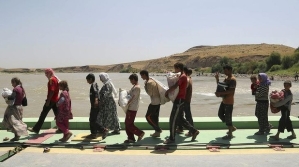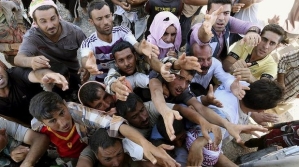
Weakened by days of dehydration, and cooked by the unrelenting sun and heat, a seemingly continuous streams of Yazidi refugees finally made their way down Mt. Sinjar, where they had been trapped for a week. On Sunday, droves of people pressed on into Iraq's northern Kurdistan region after a dangerous escape from Muslim extremist fighters, thanks in large part to US Airstrikes in the region.
Not all who tried to make the journey reached safety, however, as many accounts from the survivors point out that many died along the way, while others are still trapped in villages in the mountainous region between Iraq and Syria. Many of those villages that are still trapped have been given a deadline to "convert or die", according to survivors.
"We passed dead people on the way," Barakat Ghanem Hassan, 75, told the Washington Post. Hassan walked for two days with his wife and their 3-year-old grandson, Ayman.
The little boy, now ill and beaten from the harrowing journey, may not have living parents when the dust settles. Hassan said he does not know whether the boy's parents survived.

The Yazidis, like Christians and other religious minorities in the region, have been kidnapped, tortured and killed by the blood thirsty Islamic State's Sunni Jihadist who have seized control of large swathes of land as they make their way across Northern Iraq. The mass exodus of refugees was touched off by an assault last Sunday by Islamic State militants against the town of Sinjar, where tens of thousands of members of the Yazidi faith live. They ran for their lives to Mount Sinjar, creating a humanitarian crisis that could not be ignored any longer.
Airdropped humanitarian relief, in the form of much needed of food and water were followed by airstrikes that targeted Islamic State positions around the mountain.
The airstrikes did much to help the Yazidis escape, Zaim Hassan Harmouch told the Washington Post. He said the bombings destroyed the militant positions that had blocked his family's path to safety. He led his wife, six sons and seven grandchildren down from the mountain overnight, crossing the border into a Kurdish-held region of Syria and then back into northern Iraq.
"It was because of the planes that we could leave," he said. "They opened the way."
According to the Daily Mail, more than just food and supplies are being dropped atop the mountain to aid the besieged Yazidis.
Helicopter flights have also dropped off at least 50 armed peshmerga, Kurdish military forces, on the mountain, according to Captain Ahmed Jabar of the Iraqi Army.
According to many reports, Some refugees have snuck through Islamic State lines, evading the jihadists to reach safety, or travelled through Kurdish-controlled sections of Syria to reach the town of Dohuk.
So far the Yazidi refugees left behind have survived by hiding in old cave dwellings, hunting small game, and drinking from natural springs, according to those who have made it to safety.
But with people scattered for miles and miles across Mount Sinjar, a range stretching for around 35 miles near the border with Syria, many fear aid will not reach them all unless the humanitarian relief operation is significantly stepped up, and the terrorist responsible for the crisis are brought to justice.







